Investigating Sleep and Cognitive Function in Euthymic BD Patients
VerifiedAdded on 2022/10/04
|11
|3212
|15
Report
AI Summary
This report investigates the correlation between sleep disturbances and cognitive functioning in euthymic bipolar disorder patients. The study involved 80 participants who underwent neuropsychological tests to assess intellectual functioning, memory, attention, and executive functions. Sleep quality was evaluated through clinical measures and self-rated scales. The analysis included Spearman correlations and hierarchical regression to determine the relationship between cognitive variables and sleep difficulties. The study also compared neurocognitive performance between patients with and without sleeping difficulties using a t-test. The findings contribute to understanding the impact of sleep disruption on cognitive performance in individuals with bipolar disorder. Desklib provides access to similar reports and solved assignments for students.
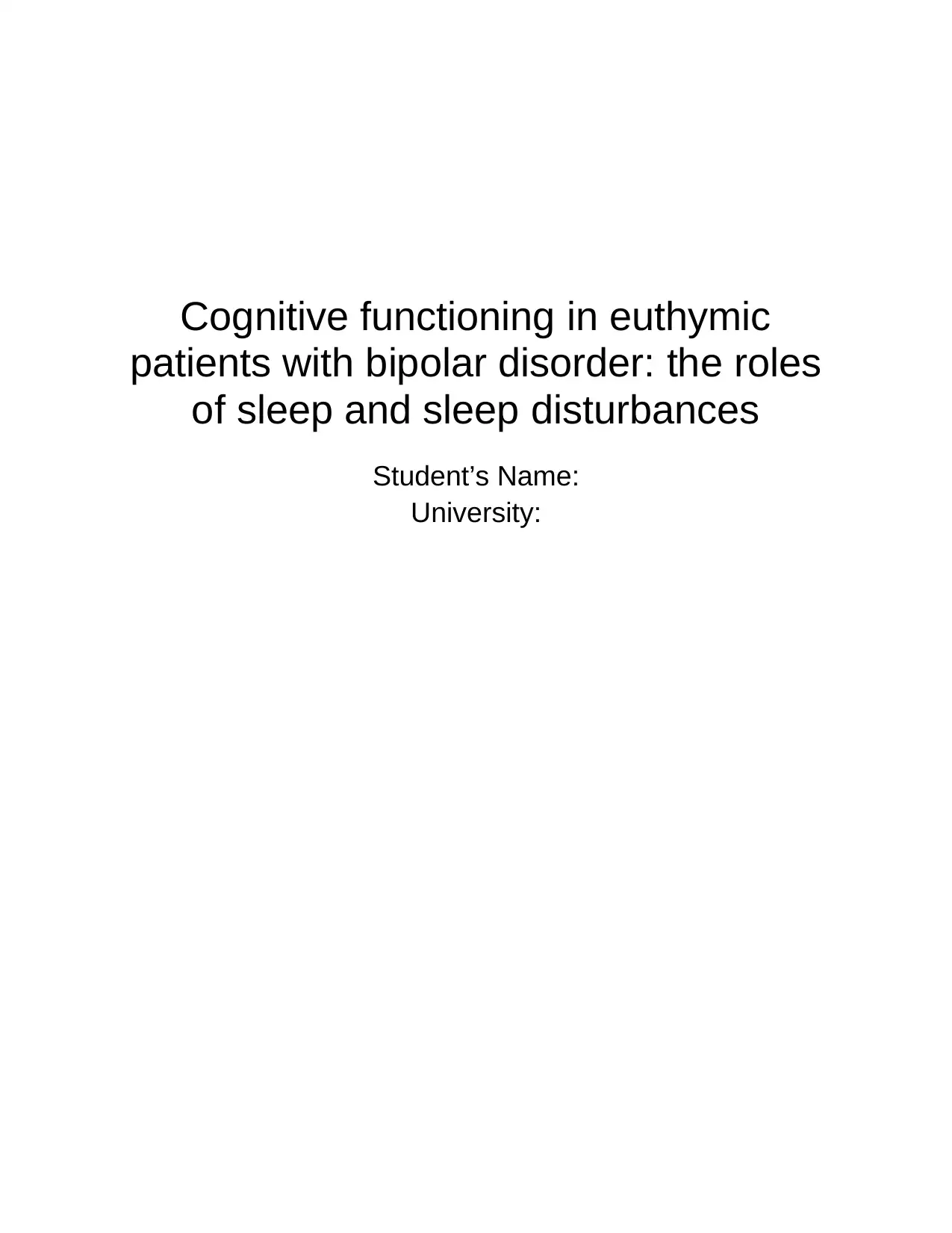
Cognitive functioning in euthymic
patients with bipolar disorder: the roles
of sleep and sleep disturbances
Student’s Name:
University:
patients with bipolar disorder: the roles
of sleep and sleep disturbances
Student’s Name:
University:
Paraphrase This Document
Need a fresh take? Get an instant paraphrase of this document with our AI Paraphraser
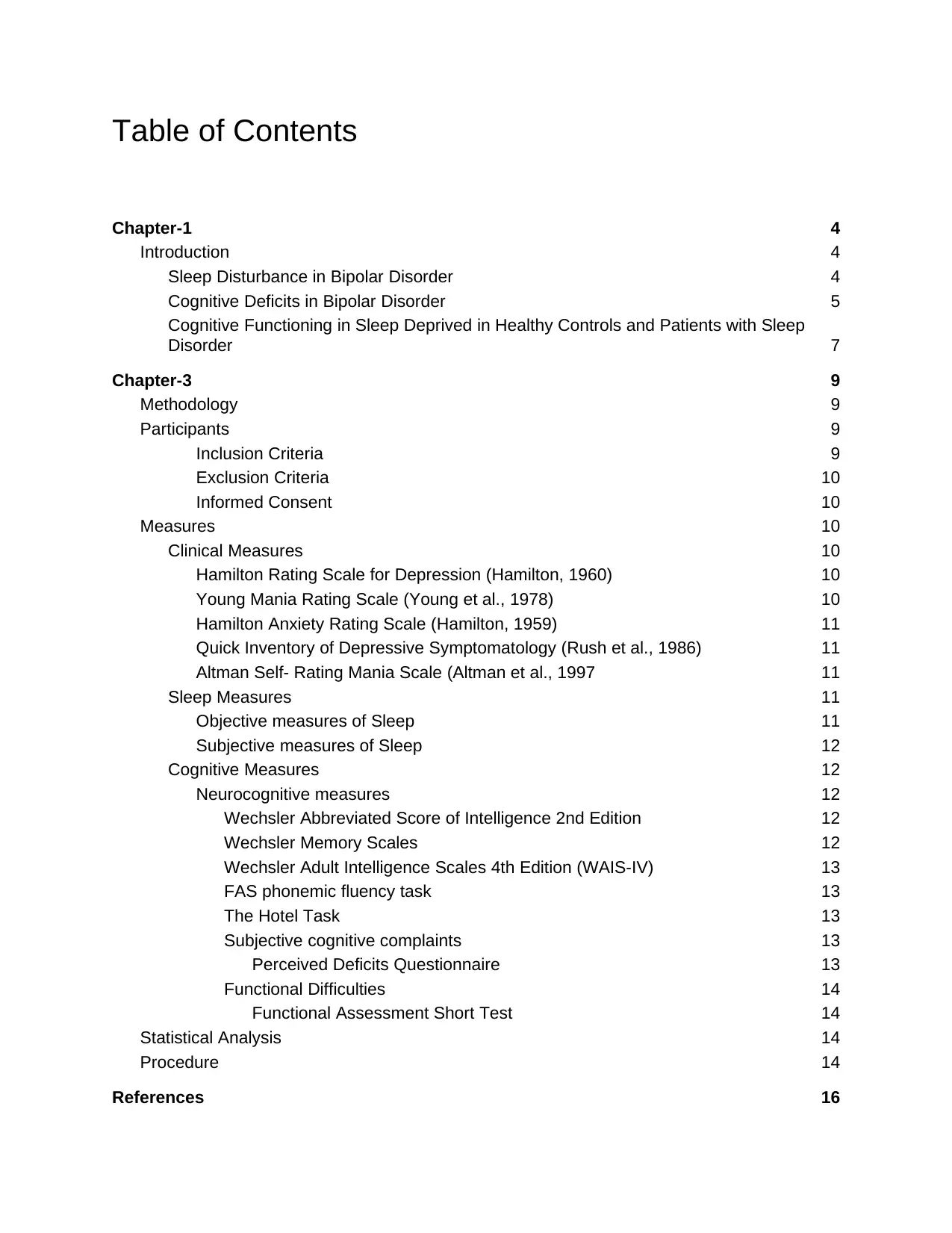
Table of Contents
Chapter-1 4
Introduction 4
Sleep Disturbance in Bipolar Disorder 4
Cognitive Deficits in Bipolar Disorder 5
Cognitive Functioning in Sleep Deprived in Healthy Controls and Patients with Sleep
Disorder 7
Chapter-3 9
Methodology 9
Participants 9
Inclusion Criteria 9
Exclusion Criteria 10
Informed Consent 10
Measures 10
Clinical Measures 10
Hamilton Rating Scale for Depression (Hamilton, 1960) 10
Young Mania Rating Scale (Young et al., 1978) 10
Hamilton Anxiety Rating Scale (Hamilton, 1959) 11
Quick Inventory of Depressive Symptomatology (Rush et al., 1986) 11
Altman Self- Rating Mania Scale (Altman et al., 1997 11
Sleep Measures 11
Objective measures of Sleep 11
Subjective measures of Sleep 12
Cognitive Measures 12
Neurocognitive measures 12
Wechsler Abbreviated Score of Intelligence 2nd Edition 12
Wechsler Memory Scales 12
Wechsler Adult Intelligence Scales 4th Edition (WAIS-IV) 13
FAS phonemic fluency task 13
The Hotel Task 13
Subjective cognitive complaints 13
Perceived Deficits Questionnaire 13
Functional Difficulties 14
Functional Assessment Short Test 14
Statistical Analysis 14
Procedure 14
References 16
Chapter-1 4
Introduction 4
Sleep Disturbance in Bipolar Disorder 4
Cognitive Deficits in Bipolar Disorder 5
Cognitive Functioning in Sleep Deprived in Healthy Controls and Patients with Sleep
Disorder 7
Chapter-3 9
Methodology 9
Participants 9
Inclusion Criteria 9
Exclusion Criteria 10
Informed Consent 10
Measures 10
Clinical Measures 10
Hamilton Rating Scale for Depression (Hamilton, 1960) 10
Young Mania Rating Scale (Young et al., 1978) 10
Hamilton Anxiety Rating Scale (Hamilton, 1959) 11
Quick Inventory of Depressive Symptomatology (Rush et al., 1986) 11
Altman Self- Rating Mania Scale (Altman et al., 1997 11
Sleep Measures 11
Objective measures of Sleep 11
Subjective measures of Sleep 12
Cognitive Measures 12
Neurocognitive measures 12
Wechsler Abbreviated Score of Intelligence 2nd Edition 12
Wechsler Memory Scales 12
Wechsler Adult Intelligence Scales 4th Edition (WAIS-IV) 13
FAS phonemic fluency task 13
The Hotel Task 13
Subjective cognitive complaints 13
Perceived Deficits Questionnaire 13
Functional Difficulties 14
Functional Assessment Short Test 14
Statistical Analysis 14
Procedure 14
References 16
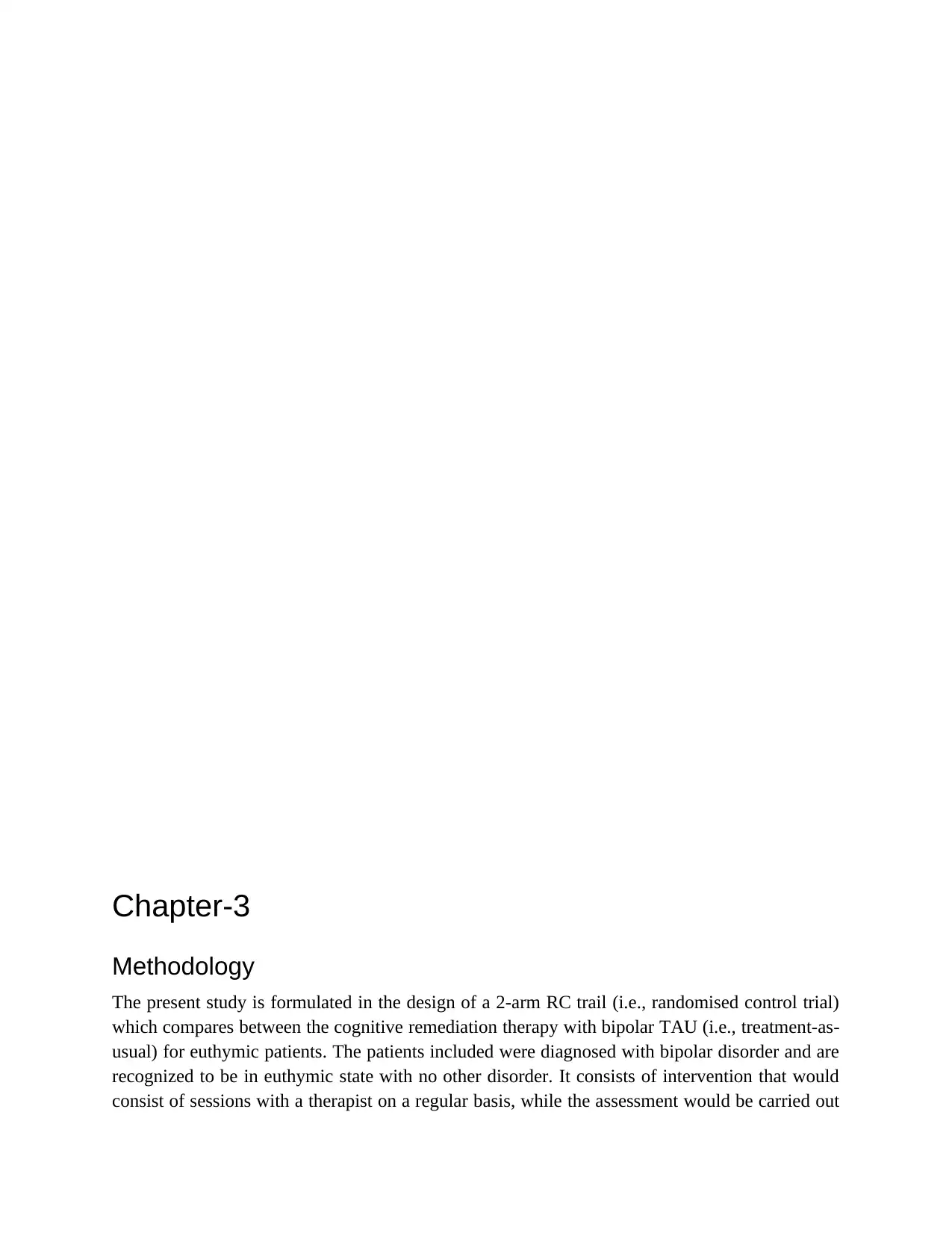
Chapter-3
Methodology
The present study is formulated in the design of a 2-arm RC trail (i.e., randomised control trial)
which compares between the cognitive remediation therapy with bipolar TAU (i.e., treatment-as-
usual) for euthymic patients. The patients included were diagnosed with bipolar disorder and are
recognized to be in euthymic state with no other disorder. It consists of intervention that would
consist of sessions with a therapist on a regular basis, while the assessment would be carried out
Methodology
The present study is formulated in the design of a 2-arm RC trail (i.e., randomised control trial)
which compares between the cognitive remediation therapy with bipolar TAU (i.e., treatment-as-
usual) for euthymic patients. The patients included were diagnosed with bipolar disorder and are
recognized to be in euthymic state with no other disorder. It consists of intervention that would
consist of sessions with a therapist on a regular basis, while the assessment would be carried out
⊘ This is a preview!⊘
Do you want full access?
Subscribe today to unlock all pages.

Trusted by 1+ million students worldwide
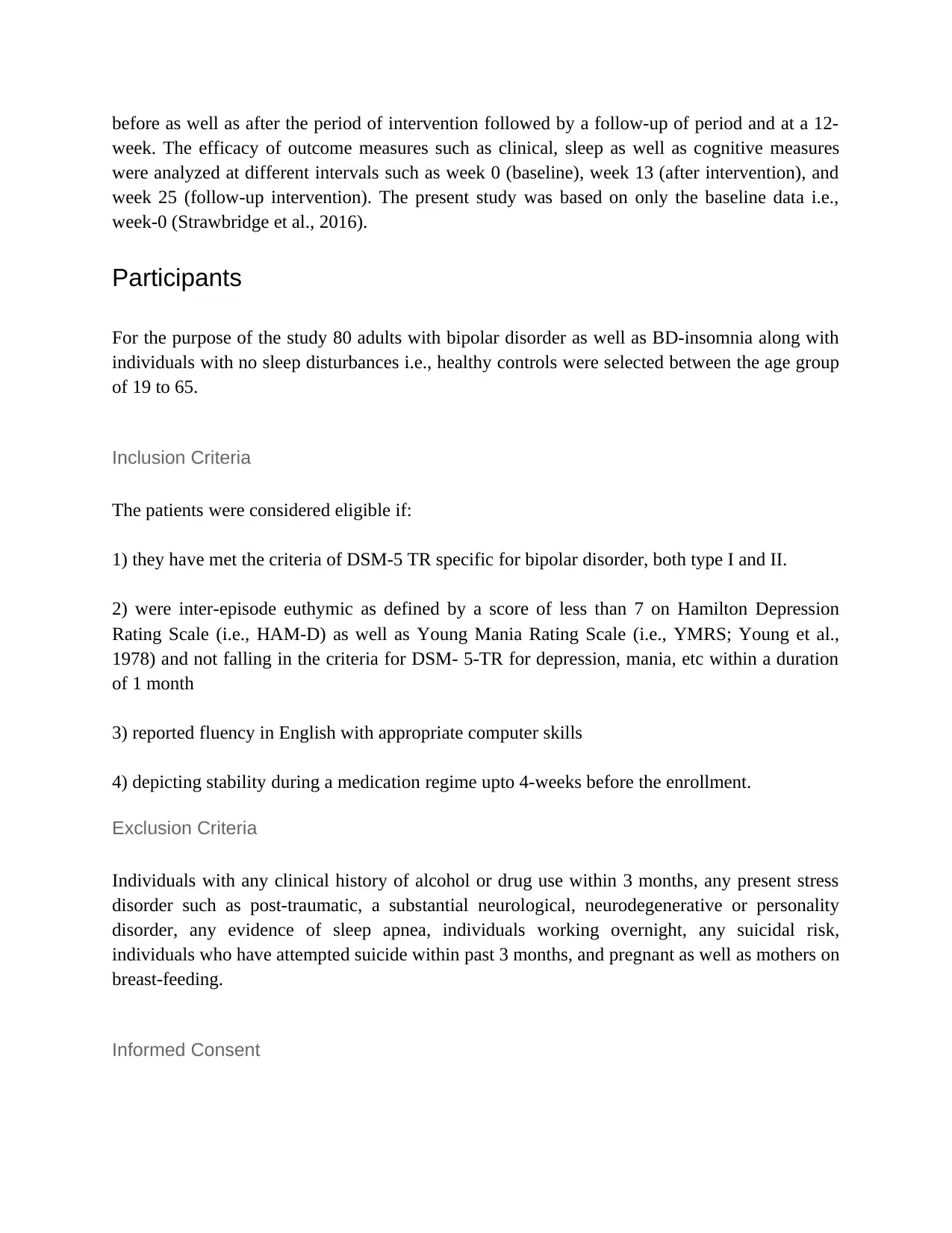
before as well as after the period of intervention followed by a follow-up of period and at a 12-
week. The efficacy of outcome measures such as clinical, sleep as well as cognitive measures
were analyzed at different intervals such as week 0 (baseline), week 13 (after intervention), and
week 25 (follow-up intervention). The present study was based on only the baseline data i.e.,
week-0 (Strawbridge et al., 2016).
Participants
For the purpose of the study 80 adults with bipolar disorder as well as BD-insomnia along with
individuals with no sleep disturbances i.e., healthy controls were selected between the age group
of 19 to 65.
Inclusion Criteria
The patients were considered eligible if:
1) they have met the criteria of DSM-5 TR specific for bipolar disorder, both type I and II.
2) were inter-episode euthymic as defined by a score of less than 7 on Hamilton Depression
Rating Scale (i.e., HAM-D) as well as Young Mania Rating Scale (i.e., YMRS; Young et al.,
1978) and not falling in the criteria for DSM- 5-TR for depression, mania, etc within a duration
of 1 month
3) reported fluency in English with appropriate computer skills
4) depicting stability during a medication regime upto 4-weeks before the enrollment.
Exclusion Criteria
Individuals with any clinical history of alcohol or drug use within 3 months, any present stress
disorder such as post-traumatic, a substantial neurological, neurodegenerative or personality
disorder, any evidence of sleep apnea, individuals working overnight, any suicidal risk,
individuals who have attempted suicide within past 3 months, and pregnant as well as mothers on
breast-feeding.
Informed Consent
week. The efficacy of outcome measures such as clinical, sleep as well as cognitive measures
were analyzed at different intervals such as week 0 (baseline), week 13 (after intervention), and
week 25 (follow-up intervention). The present study was based on only the baseline data i.e.,
week-0 (Strawbridge et al., 2016).
Participants
For the purpose of the study 80 adults with bipolar disorder as well as BD-insomnia along with
individuals with no sleep disturbances i.e., healthy controls were selected between the age group
of 19 to 65.
Inclusion Criteria
The patients were considered eligible if:
1) they have met the criteria of DSM-5 TR specific for bipolar disorder, both type I and II.
2) were inter-episode euthymic as defined by a score of less than 7 on Hamilton Depression
Rating Scale (i.e., HAM-D) as well as Young Mania Rating Scale (i.e., YMRS; Young et al.,
1978) and not falling in the criteria for DSM- 5-TR for depression, mania, etc within a duration
of 1 month
3) reported fluency in English with appropriate computer skills
4) depicting stability during a medication regime upto 4-weeks before the enrollment.
Exclusion Criteria
Individuals with any clinical history of alcohol or drug use within 3 months, any present stress
disorder such as post-traumatic, a substantial neurological, neurodegenerative or personality
disorder, any evidence of sleep apnea, individuals working overnight, any suicidal risk,
individuals who have attempted suicide within past 3 months, and pregnant as well as mothers on
breast-feeding.
Informed Consent
Paraphrase This Document
Need a fresh take? Get an instant paraphrase of this document with our AI Paraphraser
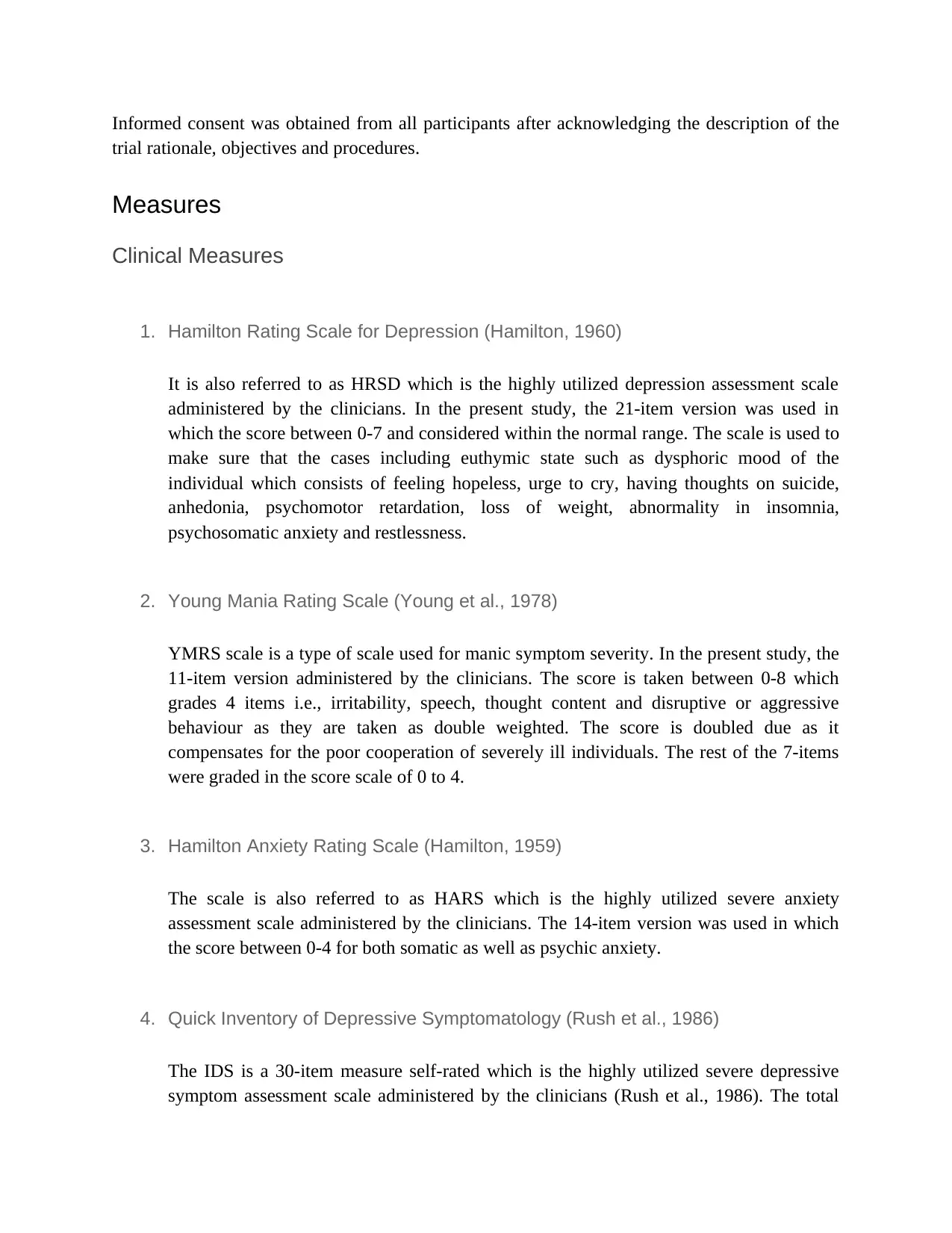
Informed consent was obtained from all participants after acknowledging the description of the
trial rationale, objectives and procedures.
Measures
Clinical Measures
1. Hamilton Rating Scale for Depression (Hamilton, 1960)
It is also referred to as HRSD which is the highly utilized depression assessment scale
administered by the clinicians. In the present study, the 21-item version was used in
which the score between 0-7 and considered within the normal range. The scale is used to
make sure that the cases including euthymic state such as dysphoric mood of the
individual which consists of feeling hopeless, urge to cry, having thoughts on suicide,
anhedonia, psychomotor retardation, loss of weight, abnormality in insomnia,
psychosomatic anxiety and restlessness.
2. Young Mania Rating Scale (Young et al., 1978)
YMRS scale is a type of scale used for manic symptom severity. In the present study, the
11-item version administered by the clinicians. The score is taken between 0-8 which
grades 4 items i.e., irritability, speech, thought content and disruptive or aggressive
behaviour as they are taken as double weighted. The score is doubled due as it
compensates for the poor cooperation of severely ill individuals. The rest of the 7-items
were graded in the score scale of 0 to 4.
3. Hamilton Anxiety Rating Scale (Hamilton, 1959)
The scale is also referred to as HARS which is the highly utilized severe anxiety
assessment scale administered by the clinicians. The 14-item version was used in which
the score between 0-4 for both somatic as well as psychic anxiety.
4. Quick Inventory of Depressive Symptomatology (Rush et al., 1986)
The IDS is a 30-item measure self-rated which is the highly utilized severe depressive
symptom assessment scale administered by the clinicians (Rush et al., 1986). The total
trial rationale, objectives and procedures.
Measures
Clinical Measures
1. Hamilton Rating Scale for Depression (Hamilton, 1960)
It is also referred to as HRSD which is the highly utilized depression assessment scale
administered by the clinicians. In the present study, the 21-item version was used in
which the score between 0-7 and considered within the normal range. The scale is used to
make sure that the cases including euthymic state such as dysphoric mood of the
individual which consists of feeling hopeless, urge to cry, having thoughts on suicide,
anhedonia, psychomotor retardation, loss of weight, abnormality in insomnia,
psychosomatic anxiety and restlessness.
2. Young Mania Rating Scale (Young et al., 1978)
YMRS scale is a type of scale used for manic symptom severity. In the present study, the
11-item version administered by the clinicians. The score is taken between 0-8 which
grades 4 items i.e., irritability, speech, thought content and disruptive or aggressive
behaviour as they are taken as double weighted. The score is doubled due as it
compensates for the poor cooperation of severely ill individuals. The rest of the 7-items
were graded in the score scale of 0 to 4.
3. Hamilton Anxiety Rating Scale (Hamilton, 1959)
The scale is also referred to as HARS which is the highly utilized severe anxiety
assessment scale administered by the clinicians. The 14-item version was used in which
the score between 0-4 for both somatic as well as psychic anxiety.
4. Quick Inventory of Depressive Symptomatology (Rush et al., 1986)
The IDS is a 30-item measure self-rated which is the highly utilized severe depressive
symptom assessment scale administered by the clinicians (Rush et al., 1986). The total
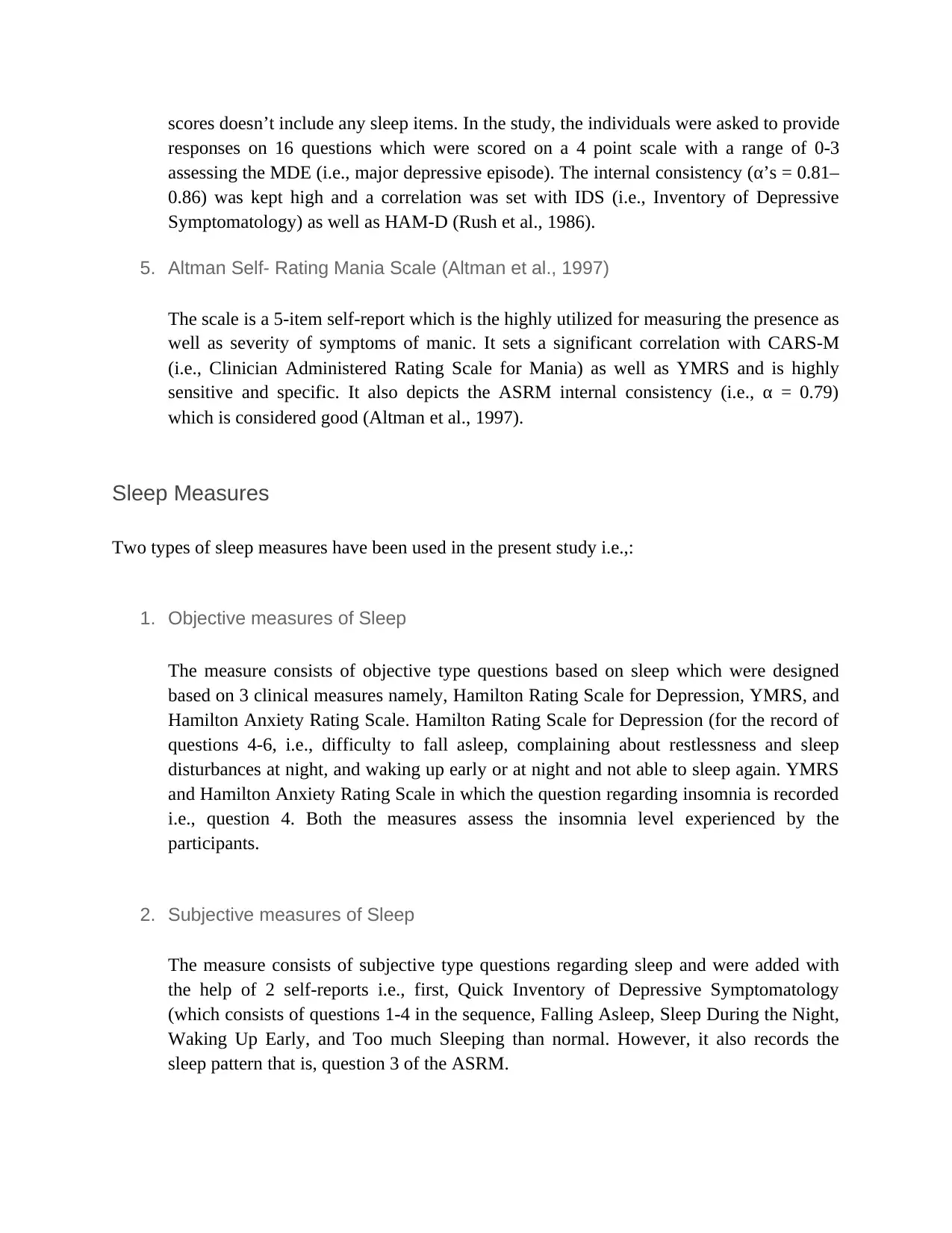
scores doesn’t include any sleep items. In the study, the individuals were asked to provide
responses on 16 questions which were scored on a 4 point scale with a range of 0-3
assessing the MDE (i.e., major depressive episode). The internal consistency (α’s = 0.81–
0.86) was kept high and a correlation was set with IDS (i.e., Inventory of Depressive
Symptomatology) as well as HAM-D (Rush et al., 1986).
5. Altman Self- Rating Mania Scale (Altman et al., 1997)
The scale is a 5-item self-report which is the highly utilized for measuring the presence as
well as severity of symptoms of manic. It sets a significant correlation with CARS-M
(i.e., Clinician Administered Rating Scale for Mania) as well as YMRS and is highly
sensitive and specific. It also depicts the ASRM internal consistency (i.e., α = 0.79)
which is considered good (Altman et al., 1997).
Sleep Measures
Two types of sleep measures have been used in the present study i.e.,:
1. Objective measures of Sleep
The measure consists of objective type questions based on sleep which were designed
based on 3 clinical measures namely, Hamilton Rating Scale for Depression, YMRS, and
Hamilton Anxiety Rating Scale. Hamilton Rating Scale for Depression (for the record of
questions 4-6, i.e., difficulty to fall asleep, complaining about restlessness and sleep
disturbances at night, and waking up early or at night and not able to sleep again. YMRS
and Hamilton Anxiety Rating Scale in which the question regarding insomnia is recorded
i.e., question 4. Both the measures assess the insomnia level experienced by the
participants.
2. Subjective measures of Sleep
The measure consists of subjective type questions regarding sleep and were added with
the help of 2 self-reports i.e., first, Quick Inventory of Depressive Symptomatology
(which consists of questions 1-4 in the sequence, Falling Asleep, Sleep During the Night,
Waking Up Early, and Too much Sleeping than normal. However, it also records the
sleep pattern that is, question 3 of the ASRM.
responses on 16 questions which were scored on a 4 point scale with a range of 0-3
assessing the MDE (i.e., major depressive episode). The internal consistency (α’s = 0.81–
0.86) was kept high and a correlation was set with IDS (i.e., Inventory of Depressive
Symptomatology) as well as HAM-D (Rush et al., 1986).
5. Altman Self- Rating Mania Scale (Altman et al., 1997)
The scale is a 5-item self-report which is the highly utilized for measuring the presence as
well as severity of symptoms of manic. It sets a significant correlation with CARS-M
(i.e., Clinician Administered Rating Scale for Mania) as well as YMRS and is highly
sensitive and specific. It also depicts the ASRM internal consistency (i.e., α = 0.79)
which is considered good (Altman et al., 1997).
Sleep Measures
Two types of sleep measures have been used in the present study i.e.,:
1. Objective measures of Sleep
The measure consists of objective type questions based on sleep which were designed
based on 3 clinical measures namely, Hamilton Rating Scale for Depression, YMRS, and
Hamilton Anxiety Rating Scale. Hamilton Rating Scale for Depression (for the record of
questions 4-6, i.e., difficulty to fall asleep, complaining about restlessness and sleep
disturbances at night, and waking up early or at night and not able to sleep again. YMRS
and Hamilton Anxiety Rating Scale in which the question regarding insomnia is recorded
i.e., question 4. Both the measures assess the insomnia level experienced by the
participants.
2. Subjective measures of Sleep
The measure consists of subjective type questions regarding sleep and were added with
the help of 2 self-reports i.e., first, Quick Inventory of Depressive Symptomatology
(which consists of questions 1-4 in the sequence, Falling Asleep, Sleep During the Night,
Waking Up Early, and Too much Sleeping than normal. However, it also records the
sleep pattern that is, question 3 of the ASRM.
⊘ This is a preview!⊘
Do you want full access?
Subscribe today to unlock all pages.

Trusted by 1+ million students worldwide
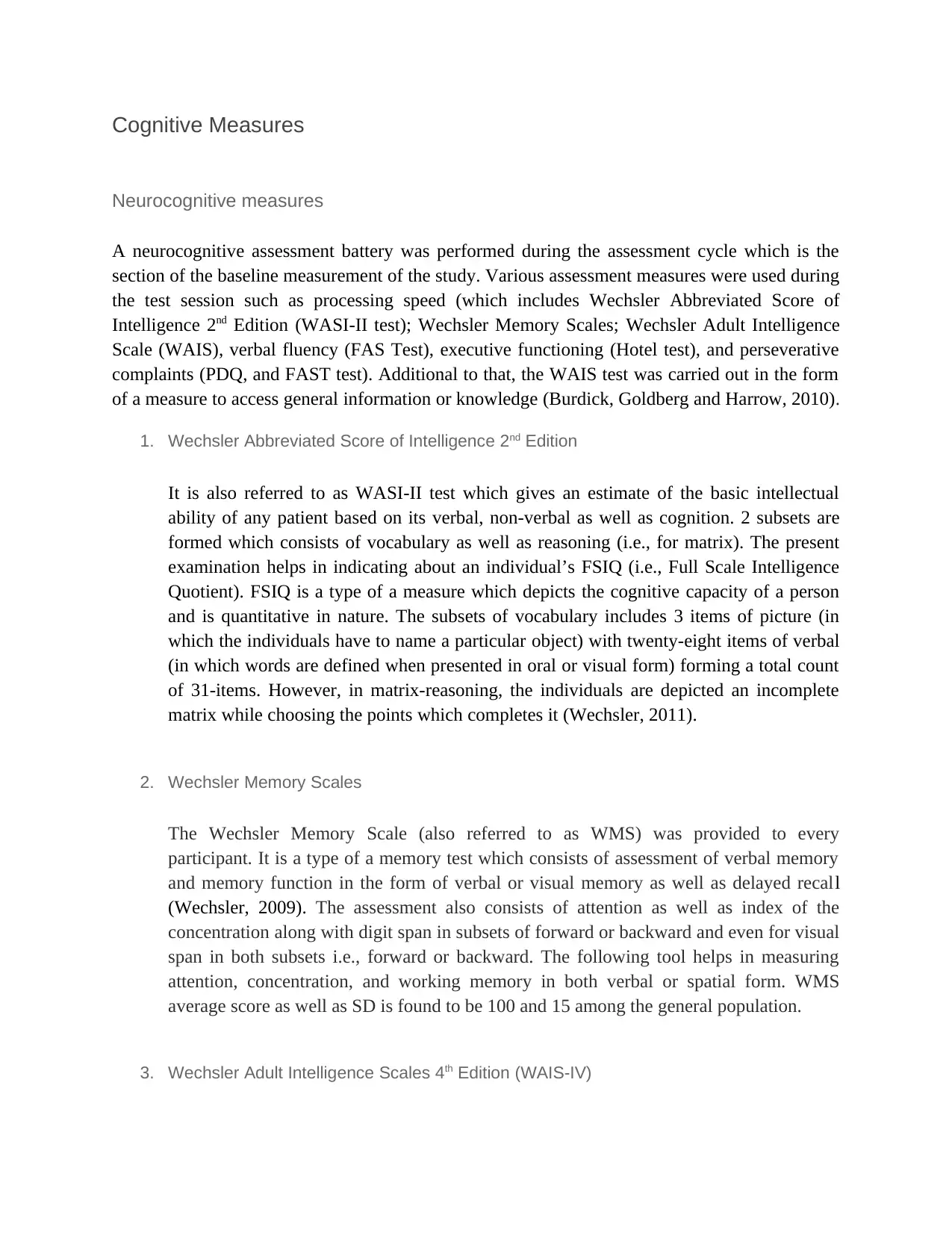
Cognitive Measures
Neurocognitive measures
A neurocognitive assessment battery was performed during the assessment cycle which is the
section of the baseline measurement of the study. Various assessment measures were used during
the test session such as processing speed (which includes Wechsler Abbreviated Score of
Intelligence 2nd Edition (WASI-II test); Wechsler Memory Scales; Wechsler Adult Intelligence
Scale (WAIS), verbal fluency (FAS Test), executive functioning (Hotel test), and perseverative
complaints (PDQ, and FAST test). Additional to that, the WAIS test was carried out in the form
of a measure to access general information or knowledge (Burdick, Goldberg and Harrow, 2010).
1. Wechsler Abbreviated Score of Intelligence 2nd Edition
It is also referred to as WASI-II test which gives an estimate of the basic intellectual
ability of any patient based on its verbal, non-verbal as well as cognition. 2 subsets are
formed which consists of vocabulary as well as reasoning (i.e., for matrix). The present
examination helps in indicating about an individual’s FSIQ (i.e., Full Scale Intelligence
Quotient). FSIQ is a type of a measure which depicts the cognitive capacity of a person
and is quantitative in nature. The subsets of vocabulary includes 3 items of picture (in
which the individuals have to name a particular object) with twenty-eight items of verbal
(in which words are defined when presented in oral or visual form) forming a total count
of 31-items. However, in matrix-reasoning, the individuals are depicted an incomplete
matrix while choosing the points which completes it (Wechsler, 2011).
2. Wechsler Memory Scales
The Wechsler Memory Scale (also referred to as WMS) was provided to every
participant. It is a type of a memory test which consists of assessment of verbal memory
and memory function in the form of verbal or visual memory as well as delayed recall
(Wechsler, 2009). The assessment also consists of attention as well as index of the
concentration along with digit span in subsets of forward or backward and even for visual
span in both subsets i.e., forward or backward. The following tool helps in measuring
attention, concentration, and working memory in both verbal or spatial form. WMS
average score as well as SD is found to be 100 and 15 among the general population.
3. Wechsler Adult Intelligence Scales 4th Edition (WAIS-IV)
Neurocognitive measures
A neurocognitive assessment battery was performed during the assessment cycle which is the
section of the baseline measurement of the study. Various assessment measures were used during
the test session such as processing speed (which includes Wechsler Abbreviated Score of
Intelligence 2nd Edition (WASI-II test); Wechsler Memory Scales; Wechsler Adult Intelligence
Scale (WAIS), verbal fluency (FAS Test), executive functioning (Hotel test), and perseverative
complaints (PDQ, and FAST test). Additional to that, the WAIS test was carried out in the form
of a measure to access general information or knowledge (Burdick, Goldberg and Harrow, 2010).
1. Wechsler Abbreviated Score of Intelligence 2nd Edition
It is also referred to as WASI-II test which gives an estimate of the basic intellectual
ability of any patient based on its verbal, non-verbal as well as cognition. 2 subsets are
formed which consists of vocabulary as well as reasoning (i.e., for matrix). The present
examination helps in indicating about an individual’s FSIQ (i.e., Full Scale Intelligence
Quotient). FSIQ is a type of a measure which depicts the cognitive capacity of a person
and is quantitative in nature. The subsets of vocabulary includes 3 items of picture (in
which the individuals have to name a particular object) with twenty-eight items of verbal
(in which words are defined when presented in oral or visual form) forming a total count
of 31-items. However, in matrix-reasoning, the individuals are depicted an incomplete
matrix while choosing the points which completes it (Wechsler, 2011).
2. Wechsler Memory Scales
The Wechsler Memory Scale (also referred to as WMS) was provided to every
participant. It is a type of a memory test which consists of assessment of verbal memory
and memory function in the form of verbal or visual memory as well as delayed recall
(Wechsler, 2009). The assessment also consists of attention as well as index of the
concentration along with digit span in subsets of forward or backward and even for visual
span in both subsets i.e., forward or backward. The following tool helps in measuring
attention, concentration, and working memory in both verbal or spatial form. WMS
average score as well as SD is found to be 100 and 15 among the general population.
3. Wechsler Adult Intelligence Scales 4th Edition (WAIS-IV)
Paraphrase This Document
Need a fresh take? Get an instant paraphrase of this document with our AI Paraphraser
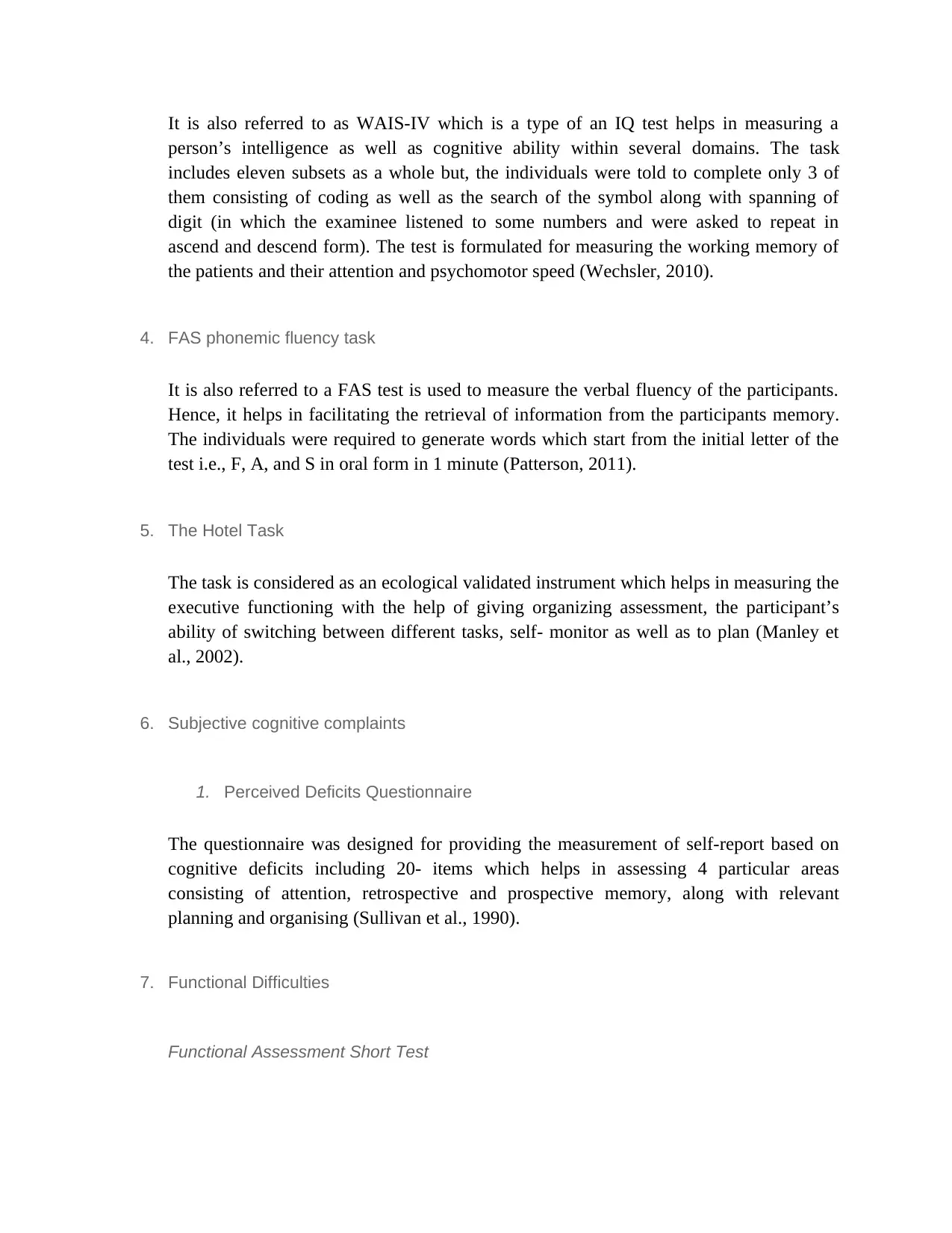
It is also referred to as WAIS-IV which is a type of an IQ test helps in measuring a
person’s intelligence as well as cognitive ability within several domains. The task
includes eleven subsets as a whole but, the individuals were told to complete only 3 of
them consisting of coding as well as the search of the symbol along with spanning of
digit (in which the examinee listened to some numbers and were asked to repeat in
ascend and descend form). The test is formulated for measuring the working memory of
the patients and their attention and psychomotor speed (Wechsler, 2010).
4. FAS phonemic fluency task
It is also referred to a FAS test is used to measure the verbal fluency of the participants.
Hence, it helps in facilitating the retrieval of information from the participants memory.
The individuals were required to generate words which start from the initial letter of the
test i.e., F, A, and S in oral form in 1 minute (Patterson, 2011).
5. The Hotel Task
The task is considered as an ecological validated instrument which helps in measuring the
executive functioning with the help of giving organizing assessment, the participant’s
ability of switching between different tasks, self- monitor as well as to plan (Manley et
al., 2002).
6. Subjective cognitive complaints
1. Perceived Deficits Questionnaire
The questionnaire was designed for providing the measurement of self-report based on
cognitive deficits including 20- items which helps in assessing 4 particular areas
consisting of attention, retrospective and prospective memory, along with relevant
planning and organising (Sullivan et al., 1990).
7. Functional Difficulties
Functional Assessment Short Test
person’s intelligence as well as cognitive ability within several domains. The task
includes eleven subsets as a whole but, the individuals were told to complete only 3 of
them consisting of coding as well as the search of the symbol along with spanning of
digit (in which the examinee listened to some numbers and were asked to repeat in
ascend and descend form). The test is formulated for measuring the working memory of
the patients and their attention and psychomotor speed (Wechsler, 2010).
4. FAS phonemic fluency task
It is also referred to a FAS test is used to measure the verbal fluency of the participants.
Hence, it helps in facilitating the retrieval of information from the participants memory.
The individuals were required to generate words which start from the initial letter of the
test i.e., F, A, and S in oral form in 1 minute (Patterson, 2011).
5. The Hotel Task
The task is considered as an ecological validated instrument which helps in measuring the
executive functioning with the help of giving organizing assessment, the participant’s
ability of switching between different tasks, self- monitor as well as to plan (Manley et
al., 2002).
6. Subjective cognitive complaints
1. Perceived Deficits Questionnaire
The questionnaire was designed for providing the measurement of self-report based on
cognitive deficits including 20- items which helps in assessing 4 particular areas
consisting of attention, retrospective and prospective memory, along with relevant
planning and organising (Sullivan et al., 1990).
7. Functional Difficulties
Functional Assessment Short Test
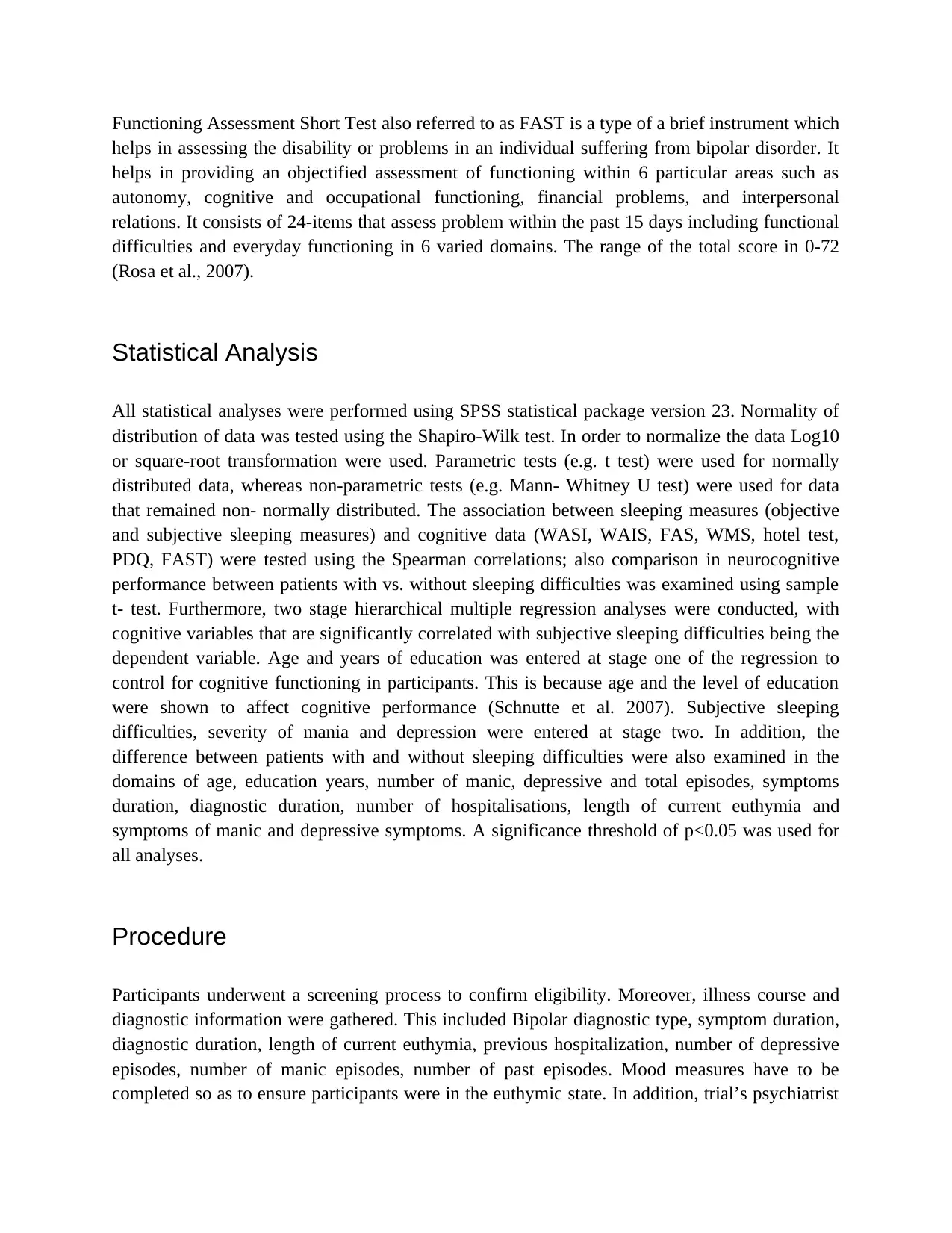
Functioning Assessment Short Test also referred to as FAST is a type of a brief instrument which
helps in assessing the disability or problems in an individual suffering from bipolar disorder. It
helps in providing an objectified assessment of functioning within 6 particular areas such as
autonomy, cognitive and occupational functioning, financial problems, and interpersonal
relations. It consists of 24-items that assess problem within the past 15 days including functional
difficulties and everyday functioning in 6 varied domains. The range of the total score in 0-72
(Rosa et al., 2007).
Statistical Analysis
All statistical analyses were performed using SPSS statistical package version 23. Normality of
distribution of data was tested using the Shapiro-Wilk test. In order to normalize the data Log10
or square-root transformation were used. Parametric tests (e.g. t test) were used for normally
distributed data, whereas non-parametric tests (e.g. Mann- Whitney U test) were used for data
that remained non- normally distributed. The association between sleeping measures (objective
and subjective sleeping measures) and cognitive data (WASI, WAIS, FAS, WMS, hotel test,
PDQ, FAST) were tested using the Spearman correlations; also comparison in neurocognitive
performance between patients with vs. without sleeping difficulties was examined using sample
t- test. Furthermore, two stage hierarchical multiple regression analyses were conducted, with
cognitive variables that are significantly correlated with subjective sleeping difficulties being the
dependent variable. Age and years of education was entered at stage one of the regression to
control for cognitive functioning in participants. This is because age and the level of education
were shown to affect cognitive performance (Schnutte et al. 2007). Subjective sleeping
difficulties, severity of mania and depression were entered at stage two. In addition, the
difference between patients with and without sleeping difficulties were also examined in the
domains of age, education years, number of manic, depressive and total episodes, symptoms
duration, diagnostic duration, number of hospitalisations, length of current euthymia and
symptoms of manic and depressive symptoms. A significance threshold of p<0.05 was used for
all analyses.
Procedure
Participants underwent a screening process to confirm eligibility. Moreover, illness course and
diagnostic information were gathered. This included Bipolar diagnostic type, symptom duration,
diagnostic duration, length of current euthymia, previous hospitalization, number of depressive
episodes, number of manic episodes, number of past episodes. Mood measures have to be
completed so as to ensure participants were in the euthymic state. In addition, trial’s psychiatrist
helps in assessing the disability or problems in an individual suffering from bipolar disorder. It
helps in providing an objectified assessment of functioning within 6 particular areas such as
autonomy, cognitive and occupational functioning, financial problems, and interpersonal
relations. It consists of 24-items that assess problem within the past 15 days including functional
difficulties and everyday functioning in 6 varied domains. The range of the total score in 0-72
(Rosa et al., 2007).
Statistical Analysis
All statistical analyses were performed using SPSS statistical package version 23. Normality of
distribution of data was tested using the Shapiro-Wilk test. In order to normalize the data Log10
or square-root transformation were used. Parametric tests (e.g. t test) were used for normally
distributed data, whereas non-parametric tests (e.g. Mann- Whitney U test) were used for data
that remained non- normally distributed. The association between sleeping measures (objective
and subjective sleeping measures) and cognitive data (WASI, WAIS, FAS, WMS, hotel test,
PDQ, FAST) were tested using the Spearman correlations; also comparison in neurocognitive
performance between patients with vs. without sleeping difficulties was examined using sample
t- test. Furthermore, two stage hierarchical multiple regression analyses were conducted, with
cognitive variables that are significantly correlated with subjective sleeping difficulties being the
dependent variable. Age and years of education was entered at stage one of the regression to
control for cognitive functioning in participants. This is because age and the level of education
were shown to affect cognitive performance (Schnutte et al. 2007). Subjective sleeping
difficulties, severity of mania and depression were entered at stage two. In addition, the
difference between patients with and without sleeping difficulties were also examined in the
domains of age, education years, number of manic, depressive and total episodes, symptoms
duration, diagnostic duration, number of hospitalisations, length of current euthymia and
symptoms of manic and depressive symptoms. A significance threshold of p<0.05 was used for
all analyses.
Procedure
Participants underwent a screening process to confirm eligibility. Moreover, illness course and
diagnostic information were gathered. This included Bipolar diagnostic type, symptom duration,
diagnostic duration, length of current euthymia, previous hospitalization, number of depressive
episodes, number of manic episodes, number of past episodes. Mood measures have to be
completed so as to ensure participants were in the euthymic state. In addition, trial’s psychiatrist
⊘ This is a preview!⊘
Do you want full access?
Subscribe today to unlock all pages.

Trusted by 1+ million students worldwide
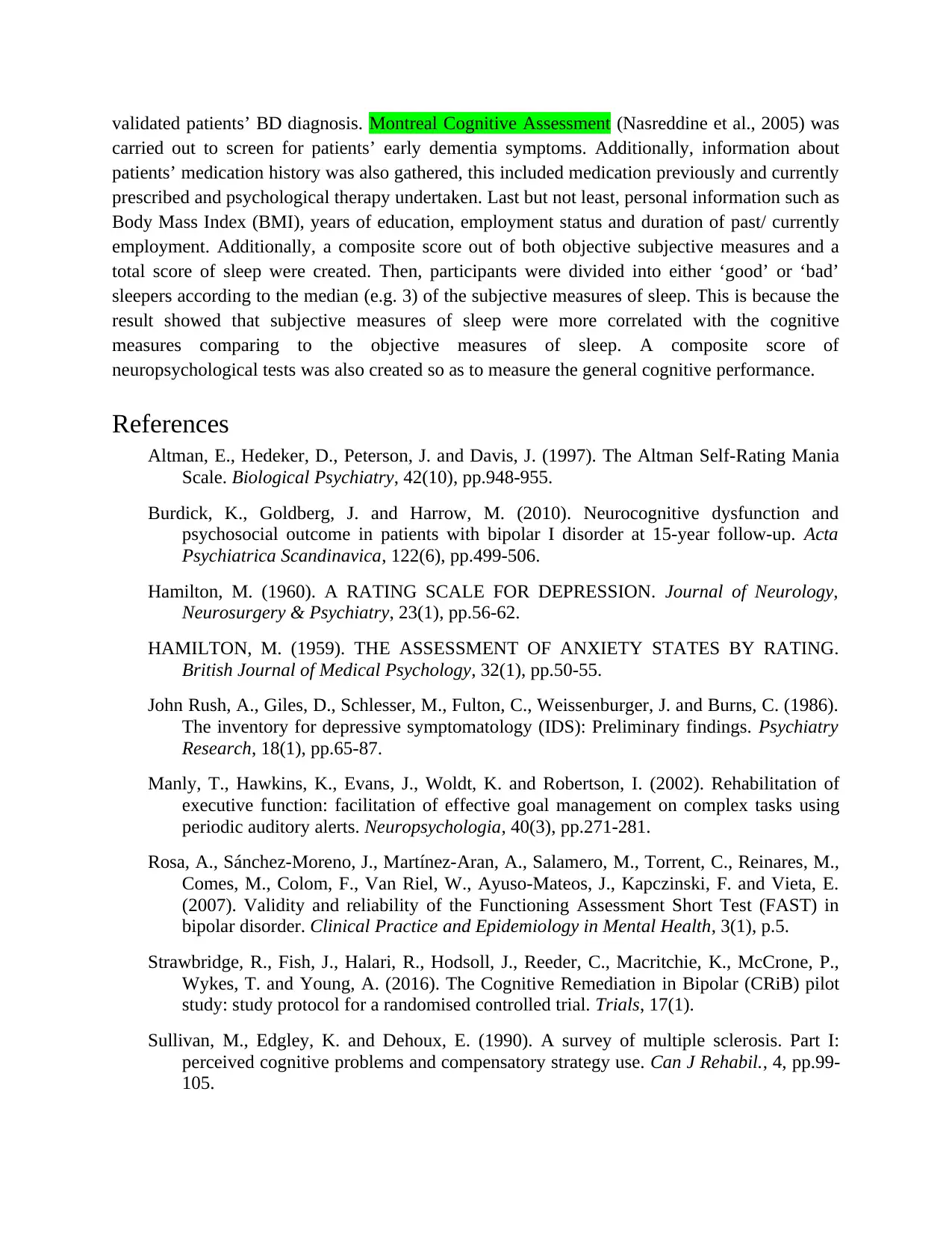
validated patients’ BD diagnosis. Montreal Cognitive Assessment (Nasreddine et al., 2005) was
carried out to screen for patients’ early dementia symptoms. Additionally, information about
patients’ medication history was also gathered, this included medication previously and currently
prescribed and psychological therapy undertaken. Last but not least, personal information such as
Body Mass Index (BMI), years of education, employment status and duration of past/ currently
employment. Additionally, a composite score out of both objective subjective measures and a
total score of sleep were created. Then, participants were divided into either ‘good’ or ‘bad’
sleepers according to the median (e.g. 3) of the subjective measures of sleep. This is because the
result showed that subjective measures of sleep were more correlated with the cognitive
measures comparing to the objective measures of sleep. A composite score of
neuropsychological tests was also created so as to measure the general cognitive performance.
References
Altman, E., Hedeker, D., Peterson, J. and Davis, J. (1997). The Altman Self-Rating Mania
Scale. Biological Psychiatry, 42(10), pp.948-955.
Burdick, K., Goldberg, J. and Harrow, M. (2010). Neurocognitive dysfunction and
psychosocial outcome in patients with bipolar I disorder at 15-year follow-up. Acta
Psychiatrica Scandinavica, 122(6), pp.499-506.
Hamilton, M. (1960). A RATING SCALE FOR DEPRESSION. Journal of Neurology,
Neurosurgery & Psychiatry, 23(1), pp.56-62.
HAMILTON, M. (1959). THE ASSESSMENT OF ANXIETY STATES BY RATING.
British Journal of Medical Psychology, 32(1), pp.50-55.
John Rush, A., Giles, D., Schlesser, M., Fulton, C., Weissenburger, J. and Burns, C. (1986).
The inventory for depressive symptomatology (IDS): Preliminary findings. Psychiatry
Research, 18(1), pp.65-87.
Manly, T., Hawkins, K., Evans, J., Woldt, K. and Robertson, I. (2002). Rehabilitation of
executive function: facilitation of effective goal management on complex tasks using
periodic auditory alerts. Neuropsychologia, 40(3), pp.271-281.
Rosa, A., Sánchez-Moreno, J., Martínez-Aran, A., Salamero, M., Torrent, C., Reinares, M.,
Comes, M., Colom, F., Van Riel, W., Ayuso-Mateos, J., Kapczinski, F. and Vieta, E.
(2007). Validity and reliability of the Functioning Assessment Short Test (FAST) in
bipolar disorder. Clinical Practice and Epidemiology in Mental Health, 3(1), p.5.
Strawbridge, R., Fish, J., Halari, R., Hodsoll, J., Reeder, C., Macritchie, K., McCrone, P.,
Wykes, T. and Young, A. (2016). The Cognitive Remediation in Bipolar (CRiB) pilot
study: study protocol for a randomised controlled trial. Trials, 17(1).
Sullivan, M., Edgley, K. and Dehoux, E. (1990). A survey of multiple sclerosis. Part I:
perceived cognitive problems and compensatory strategy use. Can J Rehabil., 4, pp.99-
105.
carried out to screen for patients’ early dementia symptoms. Additionally, information about
patients’ medication history was also gathered, this included medication previously and currently
prescribed and psychological therapy undertaken. Last but not least, personal information such as
Body Mass Index (BMI), years of education, employment status and duration of past/ currently
employment. Additionally, a composite score out of both objective subjective measures and a
total score of sleep were created. Then, participants were divided into either ‘good’ or ‘bad’
sleepers according to the median (e.g. 3) of the subjective measures of sleep. This is because the
result showed that subjective measures of sleep were more correlated with the cognitive
measures comparing to the objective measures of sleep. A composite score of
neuropsychological tests was also created so as to measure the general cognitive performance.
References
Altman, E., Hedeker, D., Peterson, J. and Davis, J. (1997). The Altman Self-Rating Mania
Scale. Biological Psychiatry, 42(10), pp.948-955.
Burdick, K., Goldberg, J. and Harrow, M. (2010). Neurocognitive dysfunction and
psychosocial outcome in patients with bipolar I disorder at 15-year follow-up. Acta
Psychiatrica Scandinavica, 122(6), pp.499-506.
Hamilton, M. (1960). A RATING SCALE FOR DEPRESSION. Journal of Neurology,
Neurosurgery & Psychiatry, 23(1), pp.56-62.
HAMILTON, M. (1959). THE ASSESSMENT OF ANXIETY STATES BY RATING.
British Journal of Medical Psychology, 32(1), pp.50-55.
John Rush, A., Giles, D., Schlesser, M., Fulton, C., Weissenburger, J. and Burns, C. (1986).
The inventory for depressive symptomatology (IDS): Preliminary findings. Psychiatry
Research, 18(1), pp.65-87.
Manly, T., Hawkins, K., Evans, J., Woldt, K. and Robertson, I. (2002). Rehabilitation of
executive function: facilitation of effective goal management on complex tasks using
periodic auditory alerts. Neuropsychologia, 40(3), pp.271-281.
Rosa, A., Sánchez-Moreno, J., Martínez-Aran, A., Salamero, M., Torrent, C., Reinares, M.,
Comes, M., Colom, F., Van Riel, W., Ayuso-Mateos, J., Kapczinski, F. and Vieta, E.
(2007). Validity and reliability of the Functioning Assessment Short Test (FAST) in
bipolar disorder. Clinical Practice and Epidemiology in Mental Health, 3(1), p.5.
Strawbridge, R., Fish, J., Halari, R., Hodsoll, J., Reeder, C., Macritchie, K., McCrone, P.,
Wykes, T. and Young, A. (2016). The Cognitive Remediation in Bipolar (CRiB) pilot
study: study protocol for a randomised controlled trial. Trials, 17(1).
Sullivan, M., Edgley, K. and Dehoux, E. (1990). A survey of multiple sclerosis. Part I:
perceived cognitive problems and compensatory strategy use. Can J Rehabil., 4, pp.99-
105.
Paraphrase This Document
Need a fresh take? Get an instant paraphrase of this document with our AI Paraphraser
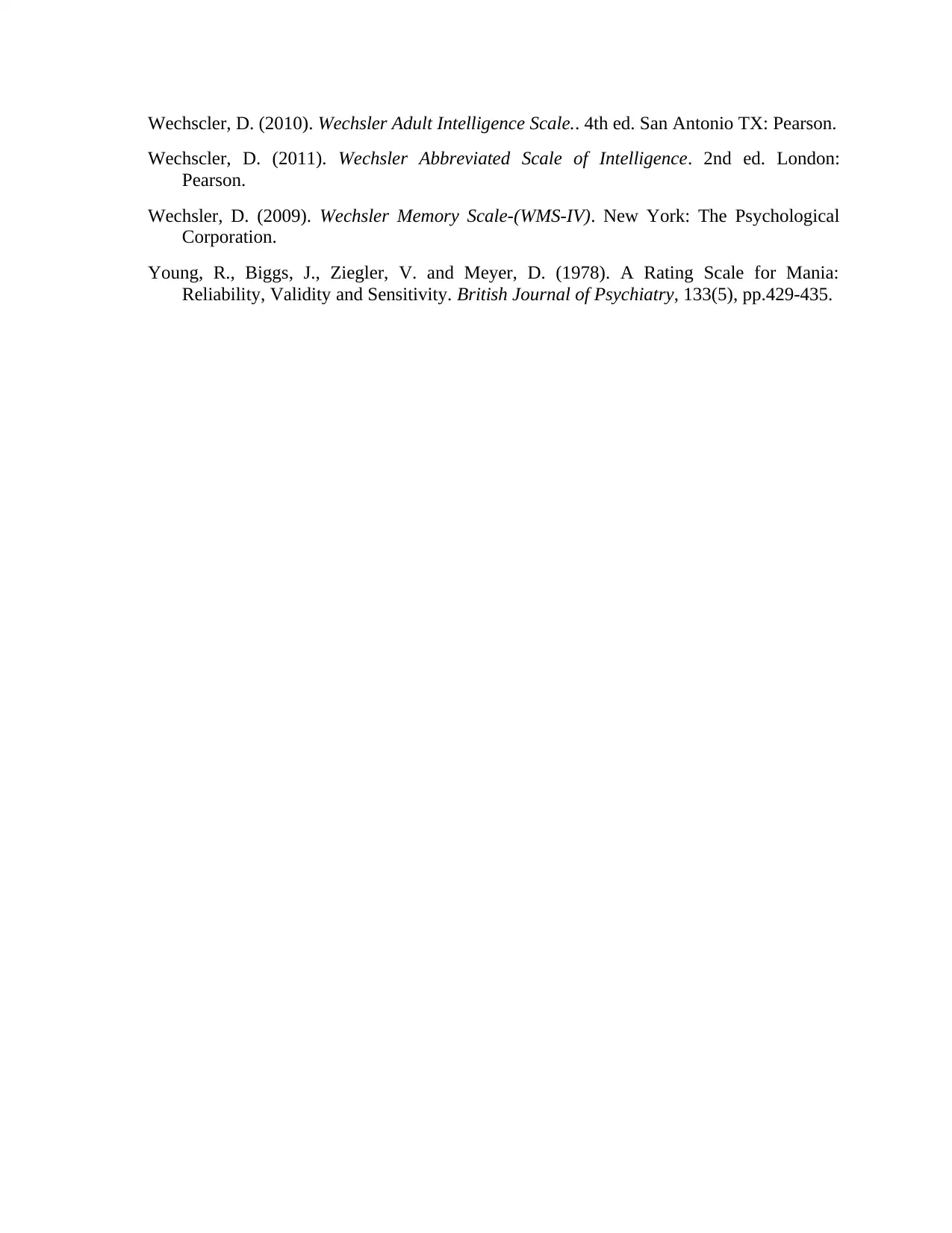
Wechscler, D. (2010). Wechsler Adult Intelligence Scale.. 4th ed. San Antonio TX: Pearson.
Wechscler, D. (2011). Wechsler Abbreviated Scale of Intelligence. 2nd ed. London:
Pearson.
Wechsler, D. (2009). Wechsler Memory Scale-(WMS-IV). New York: The Psychological
Corporation.
Young, R., Biggs, J., Ziegler, V. and Meyer, D. (1978). A Rating Scale for Mania:
Reliability, Validity and Sensitivity. British Journal of Psychiatry, 133(5), pp.429-435.
Wechscler, D. (2011). Wechsler Abbreviated Scale of Intelligence. 2nd ed. London:
Pearson.
Wechsler, D. (2009). Wechsler Memory Scale-(WMS-IV). New York: The Psychological
Corporation.
Young, R., Biggs, J., Ziegler, V. and Meyer, D. (1978). A Rating Scale for Mania:
Reliability, Validity and Sensitivity. British Journal of Psychiatry, 133(5), pp.429-435.
1 out of 11
Your All-in-One AI-Powered Toolkit for Academic Success.
+13062052269
info@desklib.com
Available 24*7 on WhatsApp / Email
![[object Object]](/_next/static/media/star-bottom.7253800d.svg)
Unlock your academic potential
Copyright © 2020–2025 A2Z Services. All Rights Reserved. Developed and managed by ZUCOL.
